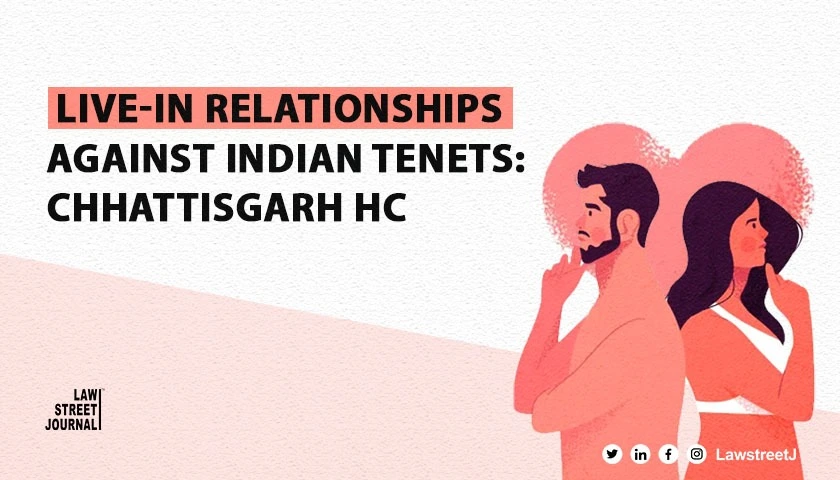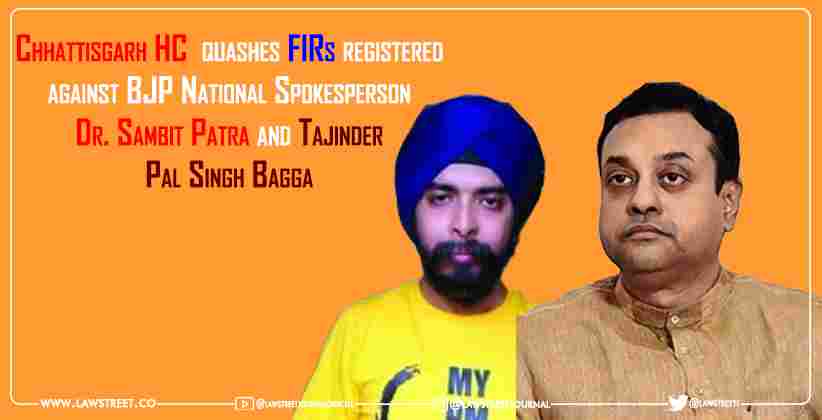Chhattisgarh: The Chhattisgarh High Court has recently held that the concept of a live-in relationship is an "imported" philosophy that goes against Indian tenets and is still viewed as a "stigma" in Indian culture. While rejecting the petition for a child born out of a live-in relationship, the court stated that live-in relationships are preferred over marriages because they offer a convenient escape when things don't work out between partners, unlike marriage, which is viewed as a social contract with legal obligations.
We are conscious of the fact that the live-in relationship, which is being followed in certain sects of society, still continues with a stigma in Indian culture. A live-in relationship is an imported philosophy contrary to the general expectations of Indian tenets. No trick would be available to hide the spot. In Indian tradition, each citizen possesses a sense of self that is unique and unlikely to be confused with imported traditions. There cannot be a more inglorious object than to adopt a live-in relationship to destroy the interwoven culture in society and tradition, the court said.
Further, the court, while emphasizing the Indian context, held that these relationships often place women in a disadvantaged position, as the man easily walks out of the live-in relationship. In contrast, due to the breakdown of relationships, women suffer far greater consequences, especially in the Indian context.
FACTS:
The court was hearing a petition filed by a man seeking custody of a child born out of a live-in relationship. The man had a live-in relationship with a woman, and they had a child together in 2021. The relationship turned sour, prompting the woman to leave with the child. The present appeal was filed after the Family Court, Dantewada, rejected the application for the custody of the child.
ARGUMENTS:
The counsel appearing for the applicant argued for the custody of the child and also argued that the marriage was performed under the Special Marriage Act of 1954, and that it was an interfaith marriage. Further, they also argued that since it was a valid marriage under Mahomedan law, the applicant should be the natural guardian of the child begotten out of such marriage. Whereas, the counsel for the respondent submitted that there is no pleading in the petition about how the marriage is valid and that the non-applicant did not convert her religion. Further, it was argued that when the first wife is living, the applicant cannot claim the second marriage as valid within the SMA of 1954, as a second marriage is not permissible thereto. Therefore, it was argued that the appellant cannot claim to be a legal guardian of the child.
DECISION:
The court, after hearing both parties and relying upon the judgment of the apex court in Ahmedabad Women Action Group v. Union of India, held that more than one marriage of a Muslim male under their personal law cannot be invoked before any court of law unless and until the same is pleaded and proved. Therefore, the court ruled that a Muslim male who is already married cannot contract another marriage without proving his personal custom or getting divorced. Further, the court also held that the contradictory statement which had been pleaded by the appellant before the family court itself goes to show that despite the fact he had a spouse living at the time of the second marriage, under the Act of 1954, he performed the second marriage which was ab initio void.
In conclusion, the court upheld the decision of the Family Court and rejected the petition filed by the man seeking custody of the child, while opining that it is very easy for a married man to walk out of a live-in relationship, and in such cases, the courts cannot shut their eyes to the vulnerable condition of the survivor of such distressful live-in relationships and children born out of such relationships.





![SC sets free man from case under SC/ST Act as offence not committed due to caste [Read Judgment]](/secure/uploads/2024/01/lj_4809_5ccb3cf2-6198-4e45-bb33-bfaa9b67a897.jpg)
![SC to consider forming guidelines on trial for deaf-dumb people [Read Order]](/secure/uploads/2024/04/lj_3160_483df315-842c-414c-9d28-65634ae6e806.webp)




